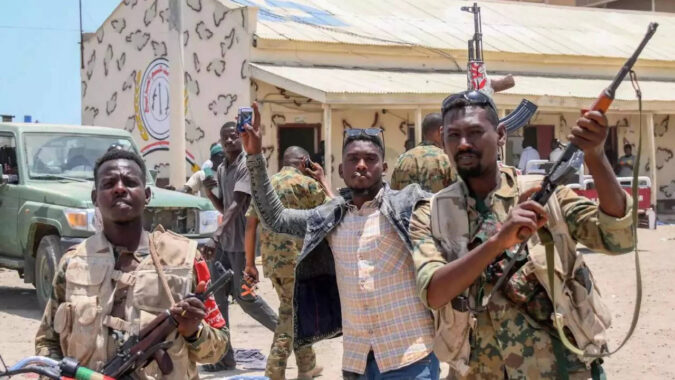N’DJAMENA: At least 320 Sudanese soldiers have fled into neighboring Chad amid fighting in their own country, authorities said.
A contingent of soldiers crossed into Chad earlier this week and have been disarmed said Daoud Yaya Brahim, Chad’s defense minister at a press conference in the capital, N’Djamena, on Wednesday.
As fighting rages in Sudan’s capital, Khartoum, between army chief Gen. Abdel Fattah Burhan and Sudan’s Rapid Support Forces (RSF), led by commander Gen. Mohammed Hamdan Dagalo, concerns of a regional spillover are increasing. After the fighting erupted on Saturday, as both sides vie for power, Chad closed its 1,400-kilometer (870-mile) border with Sudan.
The RSF is a powerful armed force and this military superiority likely explains why Sudanese troops are fleeing into Chad, say conflict analysts.
“By detaining these fleeing troops, (Chad’s president) is seeking to avoid the perception that he is allowing the Sudanese army to operate from Chad against the RSF. Chad is for the moment trying to remain neutral and help broker a cease-fire in Sudan. (However), Chad will be forced to pick sides if Sudan continues its descent into civil war,” said Benjamin Hunger, Africa analyst for Verisk Maplecroft, a risk assessment firm.
“N’Djamena is likely to oppose (Dagalo) due to fears that RSF dominance in Darfur could empower Chadian Arabs to unseat the (president’s) regime. Many within (Dagalo’s) Rizeigat tribe live across the border in Chad,” he said.
Sudan’s fighting has caused up to 20,000 Sudanese to seek refuge in eastern Chad, said the United Nations. New arrivals are entering a situation marked by soaring humanitarian needs and chronic underfunding, it added.
The country was already facing a dire humanitarian crisis. It’s surrounded by conflict-riddled nations and is hosting some 600,000 refugees from Sudan, Niger, Cameroon and Central African Republic, one of the biggest burdens in Africa, according to the U.N.
A contingent of soldiers crossed into Chad earlier this week and have been disarmed said Daoud Yaya Brahim, Chad’s defense minister at a press conference in the capital, N’Djamena, on Wednesday.
As fighting rages in Sudan’s capital, Khartoum, between army chief Gen. Abdel Fattah Burhan and Sudan’s Rapid Support Forces (RSF), led by commander Gen. Mohammed Hamdan Dagalo, concerns of a regional spillover are increasing. After the fighting erupted on Saturday, as both sides vie for power, Chad closed its 1,400-kilometer (870-mile) border with Sudan.
The RSF is a powerful armed force and this military superiority likely explains why Sudanese troops are fleeing into Chad, say conflict analysts.
“By detaining these fleeing troops, (Chad’s president) is seeking to avoid the perception that he is allowing the Sudanese army to operate from Chad against the RSF. Chad is for the moment trying to remain neutral and help broker a cease-fire in Sudan. (However), Chad will be forced to pick sides if Sudan continues its descent into civil war,” said Benjamin Hunger, Africa analyst for Verisk Maplecroft, a risk assessment firm.
“N’Djamena is likely to oppose (Dagalo) due to fears that RSF dominance in Darfur could empower Chadian Arabs to unseat the (president’s) regime. Many within (Dagalo’s) Rizeigat tribe live across the border in Chad,” he said.
Sudan’s fighting has caused up to 20,000 Sudanese to seek refuge in eastern Chad, said the United Nations. New arrivals are entering a situation marked by soaring humanitarian needs and chronic underfunding, it added.
The country was already facing a dire humanitarian crisis. It’s surrounded by conflict-riddled nations and is hosting some 600,000 refugees from Sudan, Niger, Cameroon and Central African Republic, one of the biggest burdens in Africa, according to the U.N.
